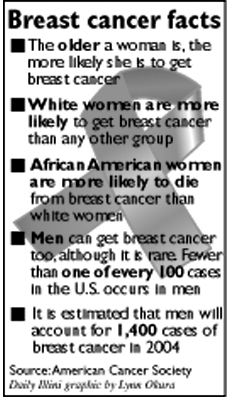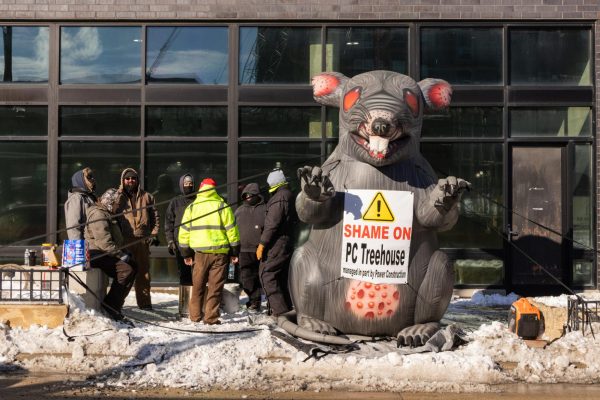Early detection saves lives

Graphic
Oct 7, 2004
It is the second leading cause of cancer death among American women. The Susan G. Komen Foundation estimates 216,000 new cases this year alone. But many women – especially college-age women – remain unaware of precautions they can take to prevent the disease.
“Breast cancer can strike at any age,” said Cathy Propst, case manager for the Illinois Breast and Cervical Cancer Program. “Just because they’re young, it doesn’t mean it can’t happen to them.”
Propst’s group and many other local and campus organization are making it their priority to promote early detection and prevention, especially this month: Breast Cancer Awareness Month.
On Oct. 9, Propst’s program and several other sponsors including the American Cancer Society, Carle Foundation Hospital and the University Young Women’s Christian Association (YWCA) will hold the second annual Women’s Health and Beauty Fair.
“Our main purpose is to reach women, those underserved, including women on campus,” said Rachel Dietkus, program coordinator at the YWCA.
Get The Daily Illini in your inbox!
The fair will offer free beauty services such as massages, paraffin hand treatments and haircuts with speakers on topics such as cancer prevention and healthy living. High-fat diets, caffeine, alcohol and smoking can all contribute to an increased risk, Propst said.
“We wanted to make the event fun while the education was going on,” she said.
The YWCA is also hosting awareness programs at sororities and residence halls this month with the Junior League of Champaign-Urbana.
“Each time I have information tables at events, I talk to at least two college-age women that have had personal scares or have been affected by it because their mom or a family member passed away because of it,” Dietkus said. “Knowing about the issue, doing monthly self-exams and really not being afraid to talk about it is important.”
Last year, the YWCA was involved in Let’s Talk, a program targeted at an even younger crowd: high school students. The purpose was not only to get students to encourage their mothers to see their doctors and schedule mammograms, but to educate them on preventive measures early on.
“A smart step is to be aware, prepared, of the causes of all types of cancer now,” said Santosh Kuruvilla, co-chair for the cancer control team in Colleges Against Cancer and senior in LAS. “The way you live now determines what problems you’ll have in the future.”
Kuruvilla’s group is behind the Think Pink campaign and will be selling the popular T-shirts on the Quad again this year. The proceeds will go to the American Cancer Society, the group’s “big brother” or “big sister,” Kuruvilla said.
“We’re hoping that this year we’ll be a huge success as well,” he said. Last year, the group sold over 1,000 T-shirts.
Colleges Against Cancer will also be passing out flyers, pink ribbons and buttons during its Think Pink Awareness Week.
“Our members are going to try to interact with more random students passing by, so at least the more people know, the more people are a little bit more aware,” Kuruvilla said.
The Alpha Kappa Delta Phi sorority based their philanthropy on raising awareness and money for the cause. Members volunteered at the Race for the Cure on Oct. 2 in Chicago and will do the same at the Walk for Hope in Chicago on Oct. 17.
“We wanted to do this because it affects a lot of women,” said Kathy Li, junior in business and officer in the sorority. “So many still aren’t aware, and since we’re a sorority, it really affected us.”
At the end of the month, the sorority will hold a date auction to raise money for the Susan G. Komen Foundation. The auction, started three years ago, has raised over $2,000 the past two years, Li said.
The Illinois Breast and Cervical Cancer Program is especially interested in targeting African-American women and minorities that may have trouble finding affordable access to care. It offers medical care free of charge to women who are income and age eligible.
“The death rate is higher for those with no insurance, those who are unable to have regular checkups,” she said.
Lifestyle changes, yearly exams and self-breast exams are all precautions women can take to lower their risk of discovering breast cancer in a later, more serious stage, Propst said.





